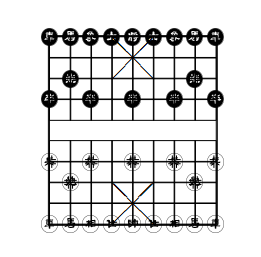[ by Charles Cameron — more striking examples of form in the news, “pressed down and flowing over” ]
.
Michael Wolff‘s book Fire and Fury: Inside the Trump White House has been quoted extensively, but one accusation struck me forcibly, both because of its viciousnes and because it has a formal property of double, parallel construction. The comparison was between Trump‘s sons Donald Jr. and Eric, and Saddam‘s sons, Uday and Qusay:
Don Jr. and Eric — behind their backs known to Trump insiders as Uday and Qusay, after the sons of Saddam Hussein — wondered if there couldn’t somehow be two parallel White House structures, one dedicated to their father’s big-picture views, personal appearance and salesmanship, and the other concerned with day-to-day management issues.
Crudely but vividly put in a Pinterest graphgc [I’ve reduced its scale, but you get the idea]:

**
Under the header, Maher Rips Trump Sons — Calls Them ‘Uday and Qusay’, Breitbart reported in September 2016 what seems to me most likely the original source of Wolff’s unsourced remark:
On the Friday airing of HBO’s “Real Time,” host Bill Maher slammed the two sons of Republican presidential nominee Donald Trump, Donald Trump, Jr. and Eric Trump.
Maher partially cited a Trump quote from his 2008 book, “Think Big,” which he used as a segue to attack the Trump children.
“Donald Trump also once said, ’Sometimes people will come into my office and they will be great. They will look great, they’ll sound great, they dress beautifully. Everything is great. Then after you hire them they turn out to be morons,’ which explains his sons Uday and Qusay.”
“I mean Trump, Sr. at the what House is bad enough without these two American psychos putting plastic over the furniture so that they can axe murder prostitutes while discussing Phil Collins,” he continued.
According to Breitbart, then, Maher would seem to be the ur-source — with just a hint that Trump himself may be partially responsible at that:
which explains his sons Uday and Qusay.
The Trump sourcing strikes me as so attenuated as to be worthless, but the tie to Maher seems undeniable — whether it’s Wolff’s only source or not.
**
Here are a couple of other items in the news which have caught my eye on account of their formal propeties. Here, from Real clear Politics, is the first:
President Trump said there was no collusion between himself on the Russians, but there was collusion between Hillary Clinton and the Russians and the Democratic National Committee and the Russians.
That strrikes me as a clear instance of what psychologists term projection — Ari Melber writes in his intro to psychologist Dr. Justin Frank, who discusses the issue with him:
Trump uses ‘projection’ as a defense tactic
Trump is an expert at projecting his own faults onto his political rivals as a defense mechanism
There are plenty of other arguable examples of Trump’s likely instinctive use of projection, but to my mind the most powerful are those that use the same words or phrases — eg: “collusion between [self, other] and the Russians” — in a short span to contrast the denial [against self] and accusation {against the other].
It’s a widely-found psychological trick — and a beautiful formal setup. The saying about “the pot calling the kettle black” summarizes it nicely, as Ari Melber obviously knows:

And dig this example:
**
A second form to keep an eye out for, and one of my own favorites, is the serpent-bites-its-tail motif, or ouroboros.
Discussing Trump saying he’llannounce his “Dishonest and Corrupt Media Awards” tomorroww:–
“I will be announcing THE MOST DISHONEST & CORRUPT MEDIA AWARDS OF THE YEAR on Monday at 5:00 o’clock,” Trump wrote. “Subjects will cover Dishonesty & Bad Reporting in various categories from the Fake News Media. Stay tuned!
Everyone in comedy took immediate advantage, proposing themslves (!) for awards:
but it was Ari Melber, host of MSNBC’s The Beat, who nailed the ouroboric implications of Trump’s challenge with this question:
Will he be physically able to give an award to anyone other than himself?
It may not feature groovy graphics, like the two late-night comedians’ tweets do — but that explicit Trumpian self-reference really stings!
Enough. I’m getting dizzy, and that’s something my doctors would scribble about it I mentioned it. Gotta save them pencil-wear — I’m not so simple as a list of symptoms, added to a single numbered diagnosis,







